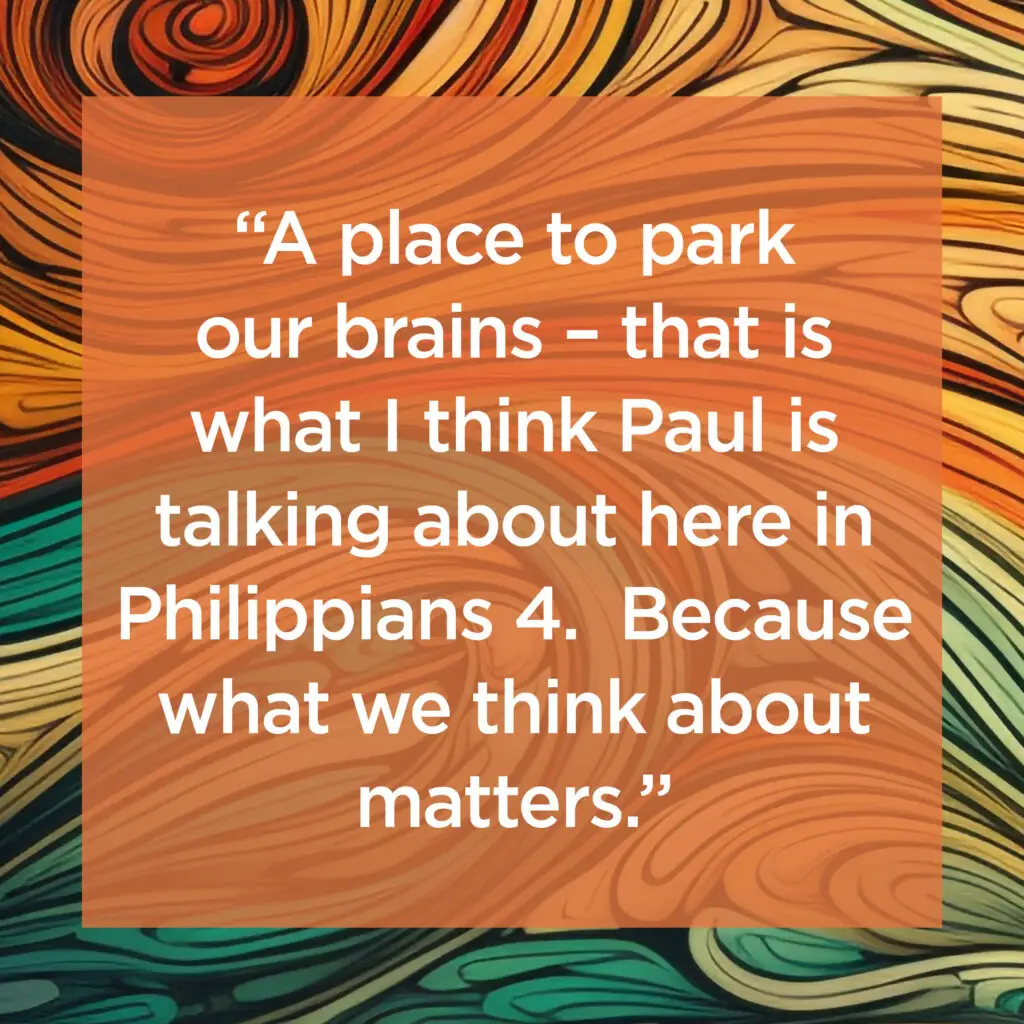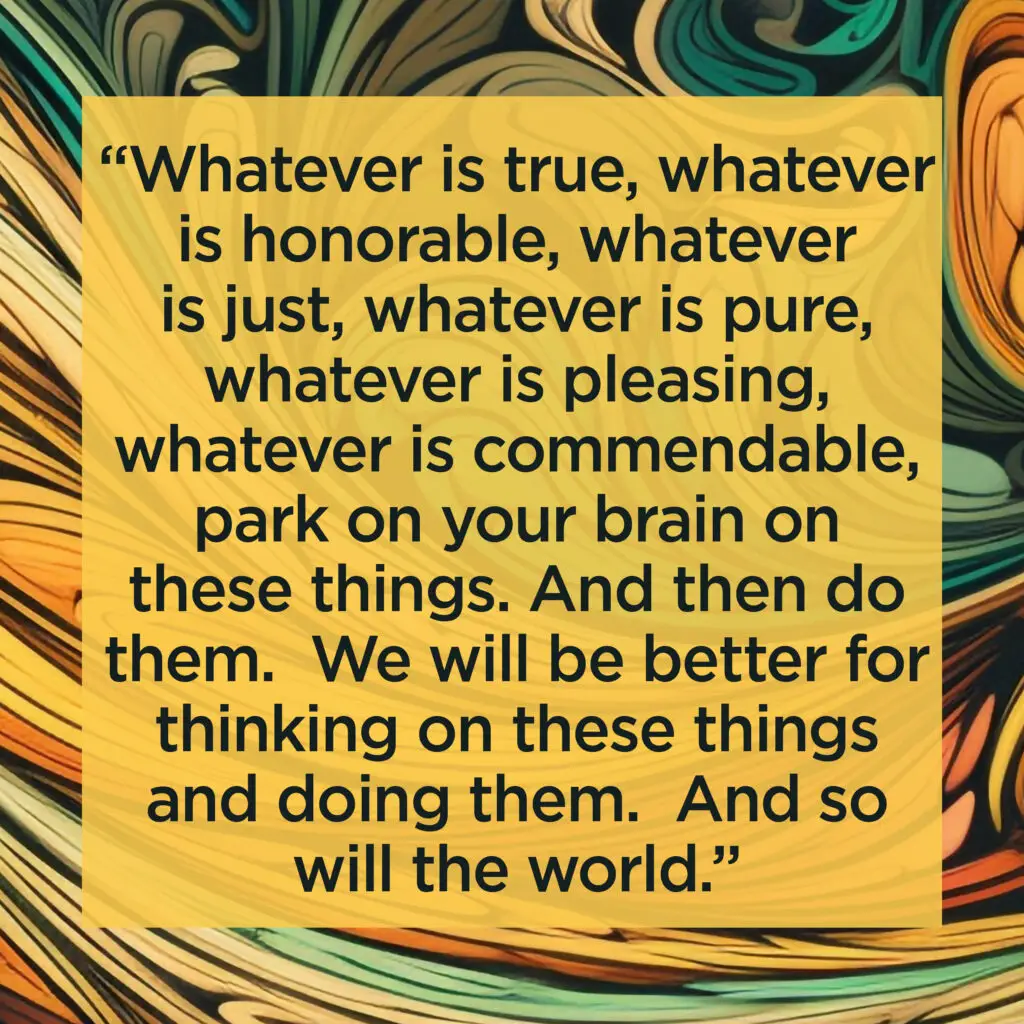When you read Paul’s letter to the Philippians it feels like he is writing to “his pride and joy, his favorite child.”1 There are none of the angry or cautionary admonitions that you find in Galatians or the l and 2 Corinthians. Instead, he writes with great affection for the Philippians and expresses gratitude for the partnership in ministry that he shares with them.
But that does not mean that all is right with this church – or that life is easy for the people in Philippi. For example, we know from this passage in chapter 4 that there is a conflict in the Philippians congregation that is affecting the whole congregation. As someone has said, we always have to remember when reading epistles in the Bible that we are “reading someone else’s mail. Paul and the Philippians knew the nature of the quarrel; we do not.”2
What we do know is that the conflict is between two leaders of the congregation, Euodia and Syntyche. Both are women, which is a reminder of something that the Church managed to overlook for nearly 2000 years: in the early congregations, women like Euodia and Syntyche here, and Lydia, Priscilla, and Phoebe elsewhere, were full-fledged leaders, recognized by Paul as partners in the gospel.
What we also know is that Paul is not willing to sweep the conflict under the rug and ignore it. Neither does he “assume he can resolve the dispute by simply saying, “Stop it!”3 Instead, he calls on members of the church in Philippi to “help these women for they have struggled beside me in the work of the gospel.” (v. 3).
In addition to problems inside the church, there are problems outside the church, opponents who intimidate or “spook” them, Paul says in 1:28. He is drawing on military language referring to a horse being spooked in the din of battle. Then, there is persecution of members of the church in Philippi, and in other parts of the Roman empire. Paul, himself, is writing this letter from a jail cell after being falsely accused of sedition and being a threat to Roman rule.
All in all, it sounds like life may be hard in Philippi for the Christians there. It sounds like believers there could easily be disillusioned, or disquieted, or disheartened about the state of things.

How about you? I wonder if you find yourself disillusioned, disheartened, or discouraged about the state of things in our world? Perhaps you find yourself feeling like you are carrying the weight of the world – witnessing from afar the carnage, suffering, and heartbreak first in Israel and now in Gaza. Perhaps you are dreading Thanksgiving because who will be at the table with you – or who will not be. Perhaps there are struggles at work or school that are keeping you awake at night, or conflicts with others that leave you unsettled, or burdens being carried by your parents or children, or other loved ones, that leave you anxious.
Then you know how the Christians in Philippi feel – and these words to the church in Philippi could not be more timely or necessary to hear. That is especially true when we remember that these are not glib “be positive” admonitions on a Pintarest sign, or words coming from a songwriter with light lyrics to “walk on the sunny side of the street,” or “don’t worry, be happy.” No, these are words written by a brother in Christ, written as he suffers in a prison cell.
Listen again to Paul’s words of encouragement and instruction for tough times:
Be gentle. Be gentle with one another. Be gentle with yourself.
Do not worry. Remember instead that the Lord is near.
Rejoice – even in these circumstances. As one commentator notes, “superficial optimism has nothing to do with what Paul calls joy. Joy in Philippians is a ‘defiant Nevertheless.’”4
Give thanks – even in these times.
All of these instructions and reminders from Paul would make sermons in themselves. There is a reason why this is one of the most popular and helpful passages in all of Paul’s letters. But today, I would like to focus on the last two verses we just read, beginning with:

“Think on these things:” The Greek word for “think” means to consider, give thought to, ponder. Kerry led a weekly women’s Bible study all during our ministry in Pottstown. A regular member of that Bible study who was open about her serious mental health struggles. One time she told the Bible study that she had been fretful during the previous week, as worries piled up. Her mind was like a hamster on a wheel and she was losing sleep. She sighed, and told the women in the group, “I need a new place to park my brain.”5

A place to park our brains – that is what I think Paul is talking about here in Philippians 4. Because what we think about matters. As David Lose, the former President of the Lutheran Seminary in Philadelphia, once reflected, “I am regularly amazed at how much what we think about shapes how we feel. [For example], we all have a mixture of memories, some of good things, some of difficult…Some of what we are proud of, others of what most shames us. The memories that we choose to dwell on shape not only our view of the past, but dominate our present and largely define our future.” What we think about, where we let our minds go, “sets, in many ways, the boundaries of what we can imagine.”6
Think about these things: what is honorable and true. Park your brain here: on what is pure, pleasing, and commendable. That is easier said than done, of course, because everything is easier said than done. Parking our brain on what is pure or admirable or commendable is also hard because the surrounding culture wants to push us in another direction.
Can you imagine, for instance, the evening news being dominated by a series of stories about what is pleasing and commendable?” Or think about the commercials that bombard us no matter on what device we are using. The ads want us to focus on what we don’t have and create a sense that our lives will always be inadequate unless we purchase what they are selling. Notice where our social media takes us – towards what is true and honorable, or towards that which makes us envious of others, or angry with others, or feeling anxious and depressed? I think we can all agree on that answer.
Paul is not telling us that to shut our minds and hearts to bad news, to ignore injustice to others or even to ourselves, or to turn away from people who are suffering, lest we feel bad. No, our model is Jesus Christ, who always looked at others with compassion and was always seeking to relieve other people’s suffering. Psalms like Psalm 9, which we heard earlier, are filled with laments and requests for God to intervene so that the wicked no longer prosper and the poor and weak no longer are abused. We are not to turn away from others’ struggles and suffering; but we are never to lose sight of Christ, knowing that, in him and with him, love conquers hate and hope outlasts despair.
Park your brain on what is pure: the unself-conscious laughter of children that causes their whole bodies to shake; the runners in a Special Olympics race who stop to help up a fallen competitor; an anonymous gift for someone in need with no strings attached.
Park your brain on what is true and honorable. I know that in these polarizing times, there are a lot of people running for election with impure motives, or who are only there to help those who think like them as opposed to seeking the common good. But in these recent elections for offices with no remuneration, think instead about those who are true public servants, willing to go through an election just so that they can help others and make the world a little better place. Or think about those doctors and nurses doing their best to treat patients in the midst of the horrors of war.
Park your brain on what is commendable. Three sisters from this congregation were recently featured in a University of Pennsylvania publication. Joanna, Mira-Belle, and Anna-Maria Haddad have made history because they are enrolled in the Dental School at the same time. “We came to America when we were teenagers because of our living situation in Lebanon,” says Joanna. “As a child, I witnessed the detrimental effects of poor oral dental care and the way it spread far beyond teeth and into people’s lives, happiness, and even the ability to enjoy food.” The sisters credit their passion for dentistry to the sacrifices their parents, Bassam and Georgina, made for them in order to immigrate to the United States over 10 years ago. All 3 hope to provide dental care to underserved and underrepresented populations.
Or consider, Van Uk Kim, who recently migrated from Burma, or Myammar, by way of Malaysia, with his family to join family here in Allentown. The first thing he wanted to do was be baptized here in church, and the first thing his family wanted to do was join this church. Now Van and his brother and sister are navigating their way through the Parkland schools in a language they are just learning. I don’t know about you, but I found middle school and high school hard enough to navigate in the language I had been speaking since birth.
Park your brain on these things, not on thoughts that lead to envy or hate. Hold fast to what is good, and not to what is toxic for healthy relationships or good mental health. We are not called to ignore the evil in the world; no, Jesus calls us to resist evil. But to resist it, we must be fortified by the good, by the things of God.
Do you remember the advice that Mr. Rogers gave parents for when they talk with children after a tragedy like 9-11 or a natural disaster like a hurricane? “Look for the helpers,” he gently said. “Look for the helpers:” that is not just good advice for parents and children. That is good advice for all of us.
Look for the helpers – and be the helpers. Paul not only urges the Philippians and us to think on these things. He also calls on us to do them: “Keep on doing the things that you have learned and received…and the God of peace will be with you.”
Karl Menninger was a pioneer in psychiatry and treating mental illness, and along with his father and brother, founded the world-famous Menninger Clinic in the early 20th century. He was also a Presbyterian. While he never minimized what counseling and medicine could offer to those battling mental illness, he also spoke to how actions can help: “Love cures people, both the ones who give it and the ones who receive it,” he once wrote. When asked by one interviewer what action he would recommend if a person were to feel a nervous breakdown coming on, he said, “Lock up your house, go across the railroad tracks, and find someone in need and do something for him.”
This past week, I went on a journey similar to one Garry Stone described in his Minute for Ministry in October. In my case, on Tuesday afternoon, I spent time with a dozen or so servants working to begin packing more than a hundred boxes of food, school supplies, and treats for local school children in food-insecure families that will be distributed close to Christmas. Then on Wednesday evening, I stuck my head in the kitchen to see three faithful servants scurrying around making dinner for our Family Promise guests, before I headed down the hall for a Session meeting, which we ended by passing the peace. On Thursday, I stopped by the conference room to say hello to three more servants working on mailing an old-fashioned hard-copy newsletter to those church members who do not use a computer.
Do you know what I heard in all four places? Lots of laughter, even in the Session meeting. Do you know what I saw, in addition to lots of people hard at work? Lots of smiles.

- Tim Boggess, Why You Will Join the Wrong Church ↩︎
- Fred Craddock, Philippians (Atlanta: John Knox Press, 1985), 70. ↩︎
- Daniel L. Migliore, Philippians and Philemon (Louisville: Westminster John Knox Press, 2014), 155. ↩︎
- Migliore, 156 (quoting Karl Barth). ↩︎
- From a sermon by Rev. Kerry Pidcock-Lester, preached on this text at First Presbyterian Church in Pottstown. ↩︎
- https://www.davidlose.net/2012/11/philippians-4-8-9/ ↩︎
